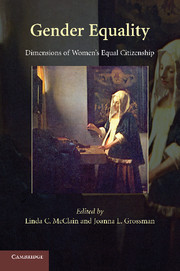Book contents
- Frontmatter
- Contents
- Contributors
- Acknowledgments
- Gender Equality
- Introduction
- PART I CONSTITUTIONAL CITIZENSHIP AND GENDER
- 1 Gender at the Margins of Contemporary Constitutional Citizenship
- 2 Becoming a Citizen: Marriage, Immigration, and Assimilation
- 3 Women's Civic Inclusion and the Bill of Rights
- 4 Must Feminists Identify as Secular Citizens? Lessons From Ontario
- 5 Feminist Fundamentalism and Constitutional Citizenship
- PART II POLITICAL CITIZENSHIP AND GENDER
- PART III SOCIAL CITIZENSHIP AND GENDER
- PART IV SEXUAL AND REPRODUCTIVE CITIZENSHIP
- PART V GLOBAL CITIZENSHIP AND GENDER
- Suggested Readings
- Index
- References
2 - Becoming a Citizen: Marriage, Immigration, and Assimilation
Published online by Cambridge University Press: 05 August 2012
- Frontmatter
- Contents
- Contributors
- Acknowledgments
- Gender Equality
- Introduction
- PART I CONSTITUTIONAL CITIZENSHIP AND GENDER
- 1 Gender at the Margins of Contemporary Constitutional Citizenship
- 2 Becoming a Citizen: Marriage, Immigration, and Assimilation
- 3 Women's Civic Inclusion and the Bill of Rights
- 4 Must Feminists Identify as Secular Citizens? Lessons From Ontario
- 5 Feminist Fundamentalism and Constitutional Citizenship
- PART II POLITICAL CITIZENSHIP AND GENDER
- PART III SOCIAL CITIZENSHIP AND GENDER
- PART IV SEXUAL AND REPRODUCTIVE CITIZENSHIP
- PART V GLOBAL CITIZENSHIP AND GENDER
- Suggested Readings
- Index
- References
Summary
Introduction
Most U.S. citizens are born that way. But for immigrants, becoming a citizen is a slow process. This process includes applying for a “green card,” which gives an immigrant the right to reside legally in the United States. A limited number of green cards are available, and applicants must demonstrate that they qualify for a green card, most commonly by showing a family relationship to a U.S. citizen or employment with a U.S. company. Obtaining a green card can take many years, and once an immigrant has obtained one, she must reside in the United States for several more years before she can apply to become a naturalized citizen, which in turn requires a civics test, an English language test, demonstration of good moral character, and an oath of loyalty to the United States. Becoming a citizen is not a one-time event that occurs when an immigrant takes the loyalty oath, but a slow process of demonstrating value to the nation and assimilation to its culture and values.
This chapter examines how this experience of becoming a citizen is affected by, and in turn further entrenches, gender inequality. Although the law of immigration and naturalization comports with principles of formal gender equality, the law, especially the law of immigration, has gendered effects. Women are eligible to apply for green cards based on a variety of qualifications, and their ability to qualify is determined primary by the economic and cultural circumstances from which they come.
- Type
- Chapter
- Information
- Gender EqualityDimensions of Women's Equal Citizenship, pp. 39 - 59Publisher: Cambridge University PressPrint publication year: 2009
References
- 2
- Cited by



